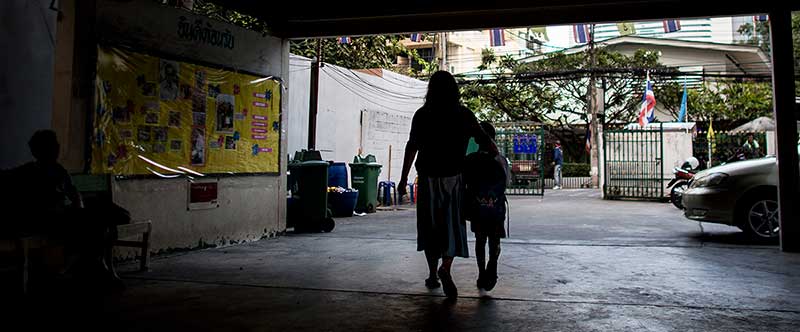
Bodies for profit
 Daniel Walker and a rescued child
Daniel Walker and a rescued childThey were 6, 7 and 9. They shuffled into the room and looked up. In their eyes, Daniel Walker saw nothing. The small boys seemed like shells.
He had been out buying a bag the previous evening, shrugging off calls from men on the side of the street.
“You want girl? You want girl?” one was asking.
Walker waved him off. In Bangkok’s Sukhumvit such questions were common. It was the heart of the Thai capital’s red light district.
Then the man tried a different question.
“You want boy?”
Walker turned.
“You have boy?” he asked. “Boy, boy?”
“I have three.”
Walker followed the man into a cafe and asked him more questions. He asked them if the boys knew what they were doing.
“Yes, yes, every day I sell them,” the man answered. “I sell to Korean, Japanese, American. They are very experienced.”
Walker arranged to meet the man the following day. He joined him in a cab. They travelled out of the traffic and smog of central Bangkok and stopped outside a suburban house in the city’s outskirts. Walker went inside with the man. Soon the boys were brought out.
Walker gave them some candy. He tried to talk to them, to coax them into some sort of answer. Then he turned back to the man. He told him that the house was a bit dirty. It did not really suit him. Could they arrange another place on another day? The man agreed. Walker pulled out a wad of Thai baht and put it in the man’s hand. It was a deposit on the boys. The deal was done. Walker was wearing a covert camera.
The footage of the transaction was given to police and the boys were eventually removed from the house. The man was a relative, it was later learned, and eventually he was prosecuted.
“After doing that, going back to chasing burglaries and car thieves didn’t seem quite as important,” Walker says in a hotel room overlooking those same streets.
Now, almost 10 years on he is still working, still trying to ensure that these sorts of abuses don't continue.
But they do.
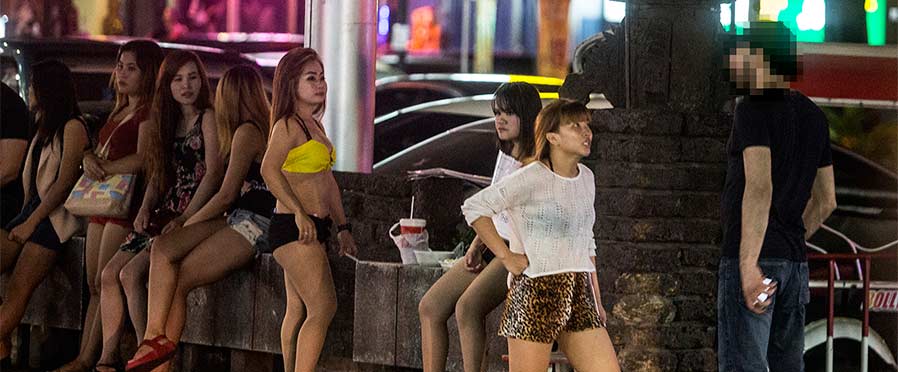

Within a couple of hundred metres of where Walker is sitting there are all the extremes of the sex industry. There are women and children trafficked from all over the world. It is estimated that worldwide more than two million people are deceived and coerced into the commercial sex industry.
They come from Issan, only a few hours north of Bangkok. They come from Laos, Myanmar, Malaysia, China and Cambodia. There are women from Eastern Europe, South America and Central Asia. Thailand is a thoroughfare. In many cases the women know exactly what work awaits them. They do so willingly. The motivation is economic.
Sometimes there is deception. Women are promised legitimate work but on arrival their passports are taken and they are told they have debt to pay off. If they do not, they are not free to leave.
And then there are the children where there is little room for ambiguity. They are victims of rape for profit and their story is not unique. Such cases form the least complex narrative in a world where black and white is hard to come by.
“All those examples are going on within a few blocks of here,” Walker says.

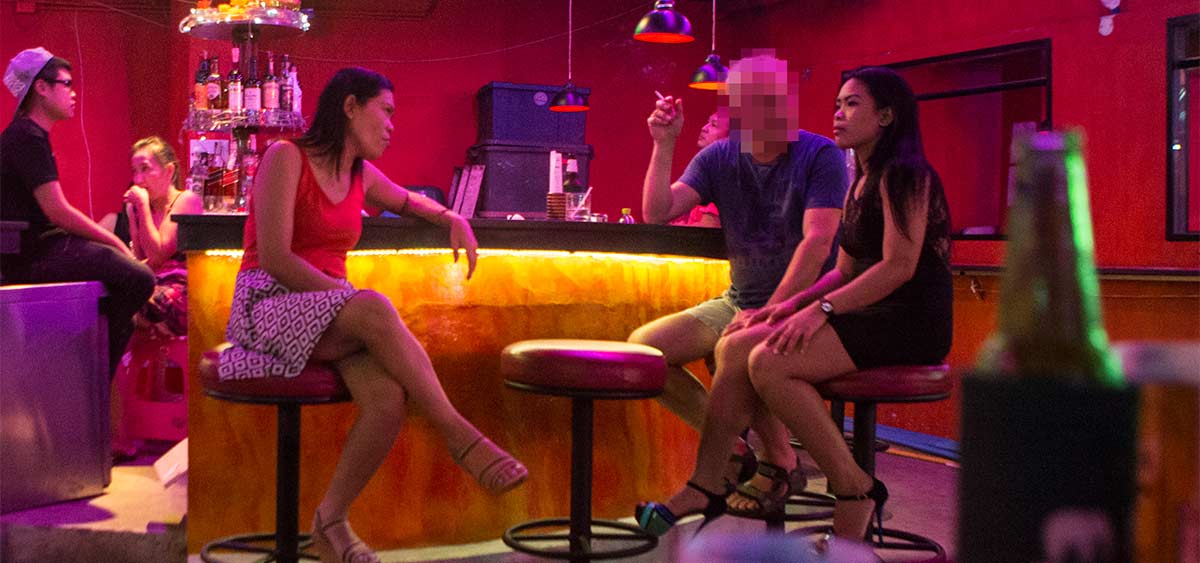



Daniel Walker is not his real name. He started using it when he began his present line of work. It’s a curious blend of the Old Testament and George Lucas that he felt summed up his attitude.
“If felt like I was in the lion’s den and everybody has a little Skywalker in them.”
The name is to protect him from those he investigates. Those, he believes, might do him or his family harm if they ever discovered his real identity.
Walker used to be a cop. He used to run the beat in Christchurch before becoming a detective. Eleven years into his career he heard about an organisation that used criminal investigators to go into the third world to gather evidence for crimes. He took four years leave from the police during which he says he helped rescue several hundred women and children.
Those three boys in that suburban house on the outskirts of Bangkok were the first.
To gather evidence he would pose as a paedophile or a sex tourist and go into places where people were being bought and sold. He would pay for their services and then try and elicit information from them about their circumstances. How did they get there? Were they forced? Did they have their passport? Did they have debt to pay? How old were they?
Then Walker would make an excuse to leave, the answers recorded on a covert camera and hand over the evidence to local police prosecute.
“I loved it. It was the perfect combination of passion and my policing experience.”
The downside, however, was that it became all consuming. It also placed trust in police forces that were almost invariably corrupt.
Walker had a wife back home in the United States where they were living at the time. Each time he would jet off to some new location he would be becoming someone else. He would be an actor, a grey man, blending into his surroundings. He was pretending to be the “bad guy”.
“Initially that seems very clear cut.”
But at other times, like when he was asked to kiss a prostitute, the delineation of where his real person started and his created persona ended began to blur.
“How do you negotiate that situation as a man and in a way that has integrity? There was no guidebook. I was making it up as I went along.”
He had no choice, he says, but to kiss her.
Then, each time, he would return to his wife without any debriefing from the organisation. The transition from work back to real life was non-existent. After four years he began to believe his own press. He was a rescuer, a modern day abolitionist, a hero who was doing the work that others were too afraid to do. But his moral compass was skewed. In all that time he had never talked to any professional about the things he had seen and experienced. No one was monitoring his work.

“It was fine in the early days, infiltrating the bad guys without them knowing. It was so easy to get evidence. I thought I was invincible. I wasn’t.”
He found himself in Jamaica with a Ukrainian women who had been previously trafficked but was now working for herself as a prostitute. She told Walker her story. He told her he didn’t want to have sex with her but he would pay for a massage. But in the course of that massage a line was crossed. He unraveled. They had sex.
He went back to his hotel room and collapsed.
“I had betrayed my wife, my marriage vows and everything I believed in.”
Ultimately, several years later, the marriage ended.
Initially, he told himself he would never again continue the work that had lead to his breakdown. He saw a police psychologist who said it would be good to write down what he had experienced during the previous years. It was out of that process that people said that perhaps he should start his own organisation. He knew how the work should not be done.
This organisation would work differently. It would be based on best practice and have a clear focus.
Walker says he did not want the work to be about imposing a simplified Western morality on a complex third world. It would be about working with local laws and values.
“Their laws state that 5-year-old girls cannot be sold for sex. It’s illegal to sell someone against their will. These are your laws.”
The organisation would be about helping local police forces enforce those laws. He called it Nvader.
“Because we invade the dark places of the world and shine a light on them.”

The “rescue industry”, as it is known, often takes a simplistic outlook. Words like “good” and “evil” creep into conversation.
Perhaps inevitably many of the organisations that work in this field have a Christian worldview. Even the term “rescue” denotes that the people engaging in that act are heroic and doing God’s work.
The reality, says Walker, is much different. While Nvader also has a Christian base, he is quick to distance himself from any connotations that might entail.

“There are no easy narratives. Rescue, hero, victim are all loaded terms that can be misrepresented and exploited.”
Even the traffickers themselves, those that pluck women and children from their homes, have stories too. At some point they made choices too, Walker says.
Some “cowboy” organisations have been kicked out of Thailand for, among other things, using photos of hill tribe children in the north and passing them off as victims of trafficking.
“These were just people living happily with their family.”
They could also “rescue” trafficked women from a brothel, swoop in, and then drop the case as soon as the plaudits arrive. However, often the women are then arrested themselves, or deported back to their country or home town without any support. Sometimes their family don’t want to see them. Sometimes the family is responsible for them being sold into the sex trade in the first place. Sometimes, without any training or alternative, they are re-trafficked within a short amount of time.
But Walker says he does not want to compete in that space. He wants to do things right all the way through - from investigation, to prosecution and, most importantly after care for the women.
“The minute we have to misrepresent what we do to get funding I will walk away. People either want to help or they don’t.”
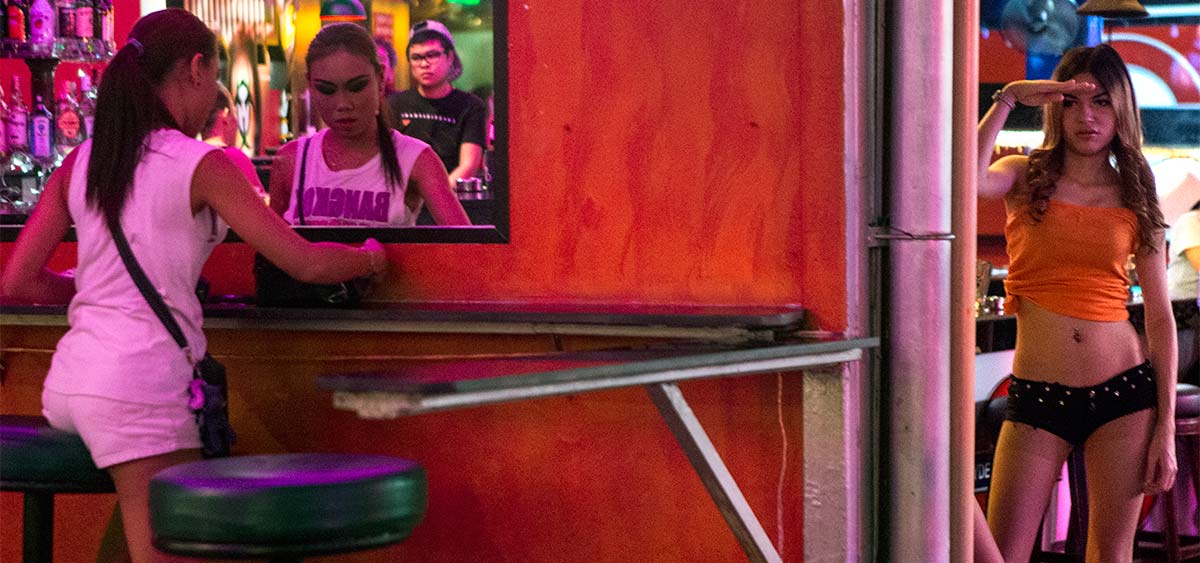





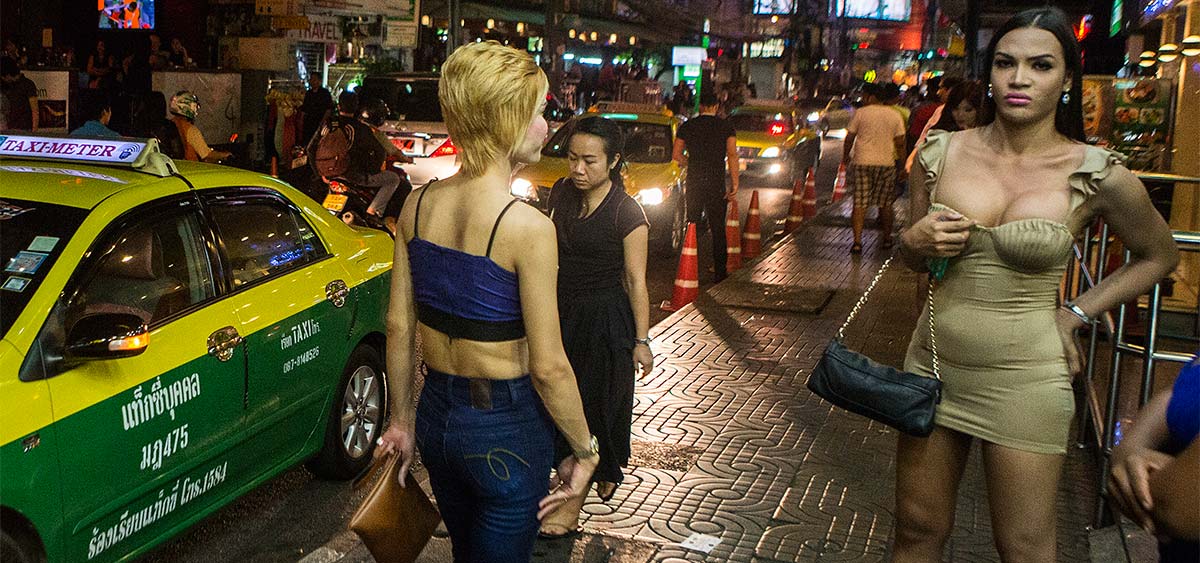

Maria sits cross legged on the edge of the bed in a hotel that appears to have no active guests. Downstairs the bar is all but empty. A line of Eastern European women are huddled together on a bench. Doc, a squat Thai with a perpetual grin, mans the lobby. Walker asks a simple question: “You have girls?”
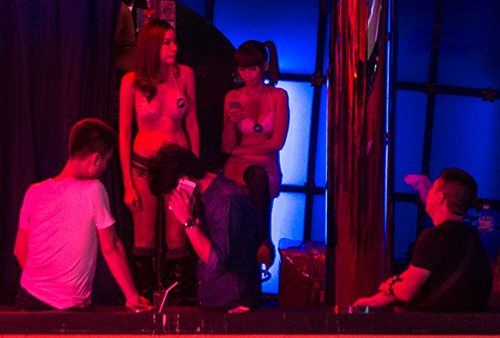
Outside is one of the most public aspects to Thailand’s sex industry. Just off Sukhumvit’s main road there are three stories high of neon lit strip clubs and bars where young women wearing little are on display for paying customers. They are almost invariably caucasian tourists. Outside women hang off lamp posts and men. Together, they stumble away.
Here, in this hotel, the transactions are hidden.
Earlier in the evening Walker has taken us through how this preliminary investigation will happen. As he attaches his covert camera he explains that we will have a cover story. We are tourists from New Zealand who all know each other. We have to, as much as possible, be ourselves. We have to keep 10 percent of ourselves concealed, he says. It makes it easier if you don’t have to lie. Because then you have to lie to cover the lie and soon your cover is blown.
“There are Thai mafia and organised crime from Russia and Eastern Europe involved in this particular location. It’s a target you don’t want to screw up on.”
He takes out a notebook and a pen and draws a rudimentary map. We will have a safe location to go to if someone discovers our identity and what we are doing.
“We are essentially going into an unknown situation with an unknown number of risks. You hope for the best but you plan for the worst.”
And if the worst does happen?
“We could die.”
Doc takes us to the fourth floor of the hotel. Each door is ajar. Inside are women from myriad countries and continents. Russia, Crimea, South America. They are all waiting. Walker goes into each room, asking where they are from, telling them they are beautiful. Speaking in rudimentary spanish.
“Me llamo Daniel.”
The women laugh awkwardly.

But he is looking for something specific. He has been told earlier in the day that there women from South America who have been trafficked to Bangkok. On arrival they have been told they have a large debt to pay off and they cannot leave until it is paid. If they do, their family back home will be in danger.
Walker goes through each room as Doc waits outside patiently. Walker goes through each room introducing himself and asking where they are from. Then he backtracks to the South Americans. He makes his pick and pays Doc 3500 baht ($NZ$140). Then he and “Maria” go to the elevator. The doors open and four men of Asian descent come out. They too are customers. But they are real.
While Iain the photographer and I make our excuses and head downstairs, Walker heads upstairs.
At the fifth floor he and Maria find a room, open it with a key card, and settle inside.
He sits down in a chair. She sits on the bed.
Walker wants to know her story. With little prompting she tells it.
“Every day, every day, every day, I pay credit, pay credit. I have no money. Only for my boss.”
When she arrived she was told that she owed US$15,000 but assured it would not take long to pay off. She knew she would be a sex worker but six months on she still has nothing for herself.
“What if you say ‘I will not pay?’” asks Walker.
“It’s too much trouble for my family. You no pay, my family pay.”
She says she cannot leave. If she does, her family will be threatened. She never did this sort of work at home in South America but heard that there was good money to be made.
“They control my time, every day they call me. I never go outside, only for work.”
“You’re like a slave,” Walker says.
“Yea,” she replies.
Downstairs in the lobby three Thai men meet at a table. We see them pull out a briefcase. One begins handing over wads of cash, hundreds of thousands of Thai baht. These are the bosses who control the money. Then they stare over at us. The men have a drink, smoke a cigarette, then leave.

This is the beginning of the work that Walker does. Gathering evidence is one part of it. The conversation with Maria was the very start of that process. There is a checklist they run through to make sure each case fits a criteria.
“We are not about rescuing people who don’t want to be rescued.”
Convincing a police officer to take on the case is another. For that he relies on Ronnie “Bom” Chiva, a Thai national who runs the investigation.
“But there are only three or four police officers in the whole country who I trust,” he says.
In the week that Fairfax Media was with Nvader Thai police raided the home of a top officer and revealed stacks of cash adding up to US$10 million. It allegedly came from bribes and misappropriation of the proceeds of crime. In a country that has been subject to almost constant flux of military coups and changes of government, finding someone to work with is one of the most difficult tasks.
The laws are clear in Thailand. Its 2008 Anti-Trafficking in Persons Act criminally prohibits all forms of trafficking and prescribes penalties from four to 10 years’ imprisonment. However, technically prostitution is also illegal but is seldom, if ever, prosecuted.
Last year, the United States State Department In the United States labelled Thailand as one of the dozen countries, along with Zimbabwe and North Korea, doing the least to combat human trafficking.
“Overall anti trafficking law enforcement efforts remained insufficient compared with the size of the problem in Thailand, and corruption at all levels hampered the success of these efforts,” the report said.
While internationally sex-trafficking forms only a small percentage of overall trafficking in labour and industrial work most of trafficking money comes from the sex trade.
“Globally, two-thirds of the profits from forced labour were generated by commercial sexual exploitation,” says a recent International Labour Organisation report. It amounted to an estimated US$99 billion dollars per year.
There are also credible reports that Thai officials protect brothels, other commercial sex venues, and seafood and sweatshop facilities from raids and inspections.
Bom used to work for the Drug Enforcement Agency before joining an anti human trafficking organisation as an investigator in the field.
“I knew nothing. I did not even know the meaning of the term at the time.”
But now, 10 years on, he is famous in certain circles for getting things done. He is seen as a relentless worker who people trust and perhaps to his detriment, he cares deeply about his work.
“Sometimes I feel that a victim is my daughter, that is how I see them. I feel like I have responsibility to save them all. I feel like when I fail that girl is going to stay in a brothel all her life. It is dangerous. It plays tricks in my head.”
Walker saw a familiar path and urged Bom to visit a psychologist. Bom did. He says it helped a little.
Raids can be tipped off. A recent raid on a brothel in Pattaya was called off after a social worker was thought to have been bribed by the brothel owner.
Even after a successful raid it is a long process. Prosecution can take up to two years.
“The woman or girl has to stay in Thailand for that period of time. She might prefer not to do that and have her own life. Some don’t want to go down that path.”
After the prosecution then the woman can be sent home.
“It’s a lot to ask of someone.”

Nvader wants to ramp up its work across the region. It is setting up an office in Chiang Mai in northern Thailand looking to work more actively with police other non-government organisations in the country. Walker acknowledges they can only do a small part of the work needed to get trafficked women and children safely home. They need the help of others.
He says that even with a concerted effort the problem seems immense.
“There are more people in slavery today than at any other time in history. It’s a massive industry and modern law enforcement is not winning.”
Authorities have been outwitted by criminals who don’t commit these crimes according to international borders, he says.
“The temptation is to throw up your hands, to change the channel and to turn the page. But the reality is that is it able to be defeated and combated.”
The men and women who profit from the industry are the same ones who need customers to walk into brothels and bars.
“It’s their greatest vulnerability as it allows us as investigators to gather evidence and spend time these women and children, not just as victims but as witnesses of crimes around them.”

Mint is crying. She is sitting on a couch in a building down a Sukhumvit alleyway. Walker has introduced us to her through another organisation called Nightlight that specialises in after care work.
Mint speaks in stuttered English about how she came to be in Bangkok from Issan. She was poor, with a young boy from a broken marriage to an abusive husband. She came to the capital in search of work. She left her son with her grandmother and made the trip south after a friend told her of a job in a restaurant that would pay her good money. But when she got here she was told that the job was not in a restaurant but in a massage parlour. Still Mint agreed. She had little option.
“I was surprised but I do need the money to take care of my son.”
Then her boss told a client that they could have sex with her without a condom. Mint refused and thought she could earn more money on the streets by herself where she would earn any profit without a boss to worry about. Sometimes her clients abused her or refused to pay her. One time she was raped and a man tried to kill her by suffocating her with a pillow.
“I cry and cry. I felt so lonely, I try so many time to kill myself. I felt like I didn’t want to live anymore.”
She learned about Nightlight through its outreach programme. The organisation offers women on the streets other employment like making jewellery and t-shirts or working in its cafe on the red light districts main road. Mint agreed and there she met women from all around the world who had been in a similar situation.
“Sometimes I feel like we live in an evil world,” she says.
But now Mint goes on outreach to find other women who want to leave the streets.
“I want the women to know the truth about how they can leave.”
She has been there for two years. She represents the end of the journey where the process is complete. She is a success story. She is 25. She brought her son to Bangkok with her. He attends school just down the road. Every afternoon she goes to collect him. He runs into her arms. Then they go and get ice cream together and walk through the roads that she used to walk alone.

Walker is packing his bags once again and heading home. He is rubbing his eyes. His contact lenses still haven’t adjusted to the Bangkok humidity. He runs his hands through his crew cut and bids us farewell.
He will spend some time at home before heading to a conference. His work takes him away for long periods of time. He speaks at events, always relaying his own story and those of the people he has met. He talks of the women and children he says he has helped save and those that he has not. Those are the ones that he still thinks of. They are the ones that are missing.
He will ask those in the audience if they want to join him on this journey. It costs money to do what he does. He has a team of investigators both in New Zealand and in Thailand and liaison between the two can have its issues. While we are in Bangkok Bom gets a call from a local police contact asking for help with a labour trafficking case. It is not strictly what Nvader is about but Bom insists that this is the way it works. We help them, they help us. Walker knows, however, that the donors might be confused as to why their donations are being used for work that is outside the organisation’s gambit.
“It’s a balancing act,” he says.
In his own life, the one where he does not have a pseudonym, Walker says he has got that right. He knows where the fake him ends and the real one begins.
